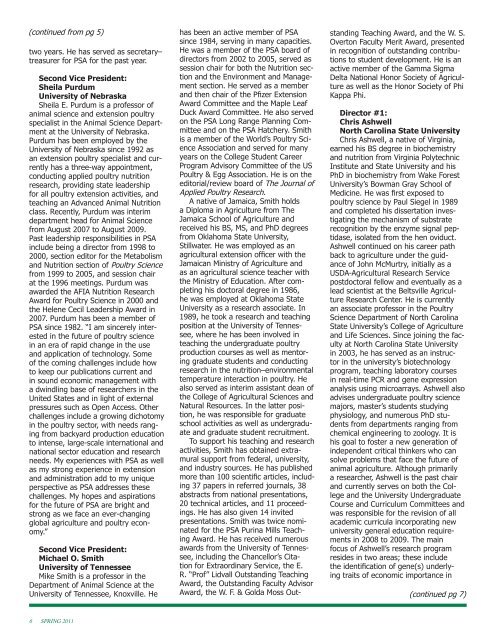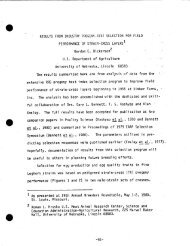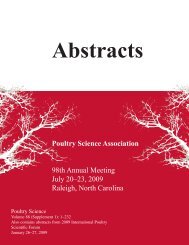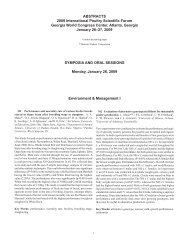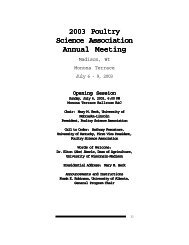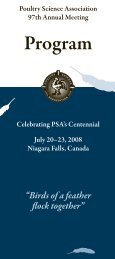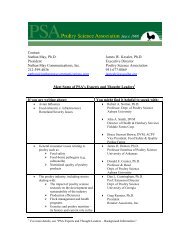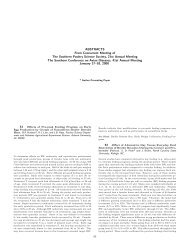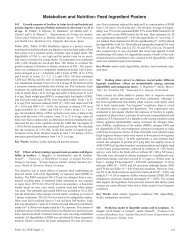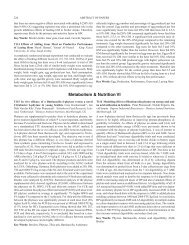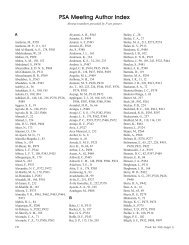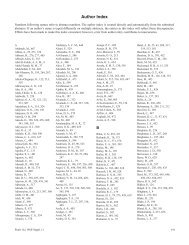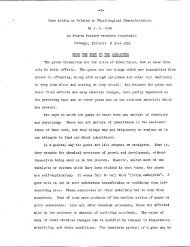April - Poultry Science Association
April - Poultry Science Association
April - Poultry Science Association
Create successful ePaper yourself
Turn your PDF publications into a flip-book with our unique Google optimized e-Paper software.
(continued from pg 5)<br />
two years. He has served as secretary–<br />
treasurer for PSA for the past year.<br />
Second Vice President:<br />
Sheila Purdum<br />
University of Nebraska<br />
Sheila E. Purdum is a professor of<br />
animal science and extension poultry<br />
specialist in the Animal <strong>Science</strong> Department<br />
at the University of Nebraska.<br />
Purdum has been employed by the<br />
University of Nebraska since 1992 as<br />
an extension poultry specialist and currently<br />
has a three-way appointment,<br />
conducting applied poultry nutrition<br />
research, providing state leadership<br />
for all poultry extension activities, and<br />
teaching an Advanced Animal Nutrition<br />
class. Recently, Purdum was interim<br />
department head for Animal <strong>Science</strong><br />
from August 2007 to August 2009.<br />
Past leadership responsibilities in PSA<br />
include being a director from 1998 to<br />
2000, section editor for the Metabolism<br />
and Nutrition section of <strong>Poultry</strong> <strong>Science</strong><br />
from 1999 to 2005, and session chair<br />
at the 1996 meetings. Purdum was<br />
awarded the AFIA Nutrition Research<br />
Award for <strong>Poultry</strong> <strong>Science</strong> in 2000 and<br />
the Helene Cecil Leadership Award in<br />
2007. Purdum has been a member of<br />
PSA since 1982. “I am sincerely interested<br />
in the future of poultry science<br />
in an era of rapid change in the use<br />
and application of technology. Some<br />
of the coming challenges include how<br />
to keep our publications current and<br />
in sound economic management with<br />
a dwindling base of researchers in the<br />
United States and in light of external<br />
pressures such as Open Access. Other<br />
challenges include a growing dichotomy<br />
in the poultry sector, with needs ranging<br />
from backyard production education<br />
to intense, large-scale international and<br />
national sector education and research<br />
needs. My experiences with PSA as well<br />
as my strong experience in extension<br />
and administration add to my unique<br />
perspective as PSA addresses these<br />
challenges. My hopes and aspirations<br />
for the future of PSA are bright and<br />
strong as we face an ever-changing<br />
global agriculture and poultry economy.”<br />
Second Vice President:<br />
Michael O. Smith<br />
University of Tennessee<br />
Mike Smith is a professor in the<br />
Department of Animal <strong>Science</strong> at the<br />
University of Tennessee, Knoxville. He<br />
has been an active member of PSA<br />
since 1984, serving in many capacities.<br />
He was a member of the PSA board of<br />
directors from 2002 to 2005, served as<br />
session chair for both the Nutrition section<br />
and the Environment and Management<br />
section. He served as a member<br />
and then chair of the Pfizer Extension<br />
Award Committee and the Maple Leaf<br />
Duck Award Committee. He also served<br />
on the PSA Long Range Planning Committee<br />
and on the PSA Hatchery. Smith<br />
is a member of the World’s <strong>Poultry</strong> <strong>Science</strong><br />
<strong>Association</strong> and served for many<br />
years on the College Student Career<br />
Program Advisory Committee of the US<br />
<strong>Poultry</strong> & Egg <strong>Association</strong>. He is on the<br />
editorial/review board of The Journal of<br />
Applied <strong>Poultry</strong> Research.<br />
A native of Jamaica, Smith holds<br />
a Diploma in Agriculture from The<br />
Jamaica School of Agriculture and<br />
received his BS, MS, and PhD degrees<br />
from Oklahoma State University,<br />
Stillwater. He was employed as an<br />
agricultural extension officer with the<br />
Jamaican Ministry of Agriculture and<br />
as an agricultural science teacher with<br />
the Ministry of Education. After completing<br />
his doctoral degree in 1986,<br />
he was employed at Oklahoma State<br />
University as a research associate. In<br />
1989, he took a research and teaching<br />
position at the University of Tennessee,<br />
where he has been involved in<br />
teaching the undergraduate poultry<br />
production courses as well as mentoring<br />
graduate students and conducting<br />
research in the nutrition–environmental<br />
temperature interaction in poultry. He<br />
also served as interim assistant dean of<br />
the College of Agricultural <strong>Science</strong>s and<br />
Natural Resources. In the latter position,<br />
he was responsible for graduate<br />
school activities as well as undergraduate<br />
and graduate student recruitment.<br />
To support his teaching and research<br />
activities, Smith has obtained extramural<br />
support from federal, university,<br />
and industry sources. He has published<br />
more than 100 scientific articles, including<br />
37 papers in referred journals, 38<br />
abstracts from national presentations,<br />
20 technical articles, and 11 proceedings.<br />
He has also given 14 invited<br />
presentations. Smith was twice nominated<br />
for the PSA Purina Mills Teaching<br />
Award. He has received numerous<br />
awards from the University of Tennessee,<br />
including the Chancellor’s Citation<br />
for Extraordinary Service, the E.<br />
R. “Prof” Lidvall Outstanding Teaching<br />
Award, the Outstanding Faculty Advisor<br />
Award, the W. F. & Golda Moss Outstanding<br />
Teaching Award, and the W. S.<br />
Overton Faculty Merit Award, presented<br />
in recognition of outstanding contributions<br />
to student development. He is an<br />
active member of the Gamma Sigma<br />
Delta National Honor Society of Agriculture<br />
as well as the Honor Society of Phi<br />
Kappa Phi.<br />
Director #1:<br />
Chris Ashwell<br />
North Carolina State University<br />
Chris Ashwell, a native of Virginia,<br />
earned his BS degree in biochemistry<br />
and nutrition from Virginia Polytechnic<br />
Institute and State University and his<br />
PhD in biochemistry from Wake Forest<br />
University’s Bowman Gray School of<br />
Medicine. He was first exposed to<br />
poultry science by Paul Siegel in 1989<br />
and completed his dissertation investigating<br />
the mechanism of substrate<br />
recognition by the enzyme signal peptidase,<br />
isolated from the hen oviduct.<br />
Ashwell continued on his career path<br />
back to agriculture under the guidance<br />
of John McMurtry, initially as a<br />
USDA-Agricultural Research Service<br />
postdoctoral fellow and eventually as a<br />
lead scientist at the Beltsville Agriculture<br />
Research Center. He is currently<br />
an associate professor in the <strong>Poultry</strong><br />
<strong>Science</strong> Department of North Carolina<br />
State University’s College of Agriculture<br />
and Life <strong>Science</strong>s. Since joining the faculty<br />
at North Carolina State University<br />
in 2003, he has served as an instructor<br />
in the university’s biotechnology<br />
program, teaching laboratory courses<br />
in real-time PCR and gene expression<br />
analysis using microarrays. Ashwell also<br />
advises undergraduate poultry science<br />
majors, master’s students studying<br />
physiology, and numerous PhD students<br />
from departments ranging from<br />
chemical engineering to zoology. It is<br />
his goal to foster a new generation of<br />
independent critical thinkers who can<br />
solve problems that face the future of<br />
animal agriculture. Although primarily<br />
a researcher, Ashwell is the past chair<br />
and currently serves on both the College<br />
and the University Undergraduate<br />
Course and Curriculum Committees and<br />
was responsible for the revision of all<br />
academic curricula incorporating new<br />
university general education requirements<br />
in 2008 to 2009. The main<br />
focus of Ashwell’s research program<br />
resides in two areas; these include<br />
the identification of gene(s) underlying<br />
traits of economic importance in<br />
(continued pg 7)<br />
6 SPRING 2011


